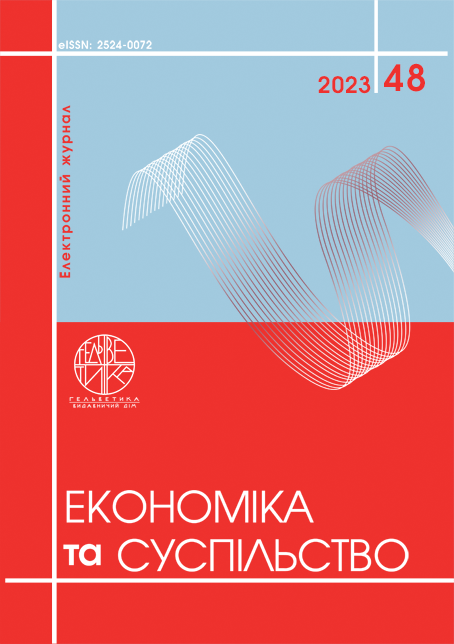МАРКЕТИНГОВІ ІНСТРУМЕНТИ ПРОСУВАННЯ ЕКОЛОГІЧНИХ БРЕНДІВ В ПАРАДИГМІ СТАЛОГО РОЗВИТКУ
Анотація
В статті обґрунтовані основні положення концепції екологічного маркетингу в умовах сталого розвитку. Визначені умови виникнення концепції екологічного маркетингу та її взаємозв’язок з парадигмою сталого розвитку. Розглянуті теоретичні засади формування концепції екологічного маркетингу. Обґрунтовані маркетингові інструменти просування екологічних брендів в парадигмі сталого розвитку. В результаті проведеного аналізу, визначено атрибути екологічних брендів, які створюють цінність екологічних брендів. В контексті цього підходу булі запропоновані стратегії позиціонування брендів в поєднані з функціональними, емоційними вигодами, вигодами самовираження, екологічними та соціальними вигодами. Запропоновані маркетингові інструменти просування екологічних брендів. Вдосконалено Модель атрибутів еко-брендів на основі підходу Brand Pyramid.
Посилання
Elkington J. (1997) Cannibals with Forks: the Triple Bottom Line of 21st Century Business. Capstone : Oxford. 424 p.
Lozano R. (2012) Towards better embedding sustainability into companies' systems: an analysis of voluntary corporate initiatives. Journal of Cleaner Production. 25, 14–26.
Banerjee S.B. (2003) Who sustains whose development? Sustainable development and the reinvention of nature. 24 (1), 143–180.
Lankoski L. (2016) Alternative conceptions of sustainability in a business context Journal of Cleaner Production. 139, 847–857.
Villiers C. (2016) A new conceptual model of influences driving sustainability based on case evidence of the integration of corporate sustainability management control and reporting. Journal of Cleaner Production. 136-A, 78–85.
Hediger W. (2010) Welfare and capital-theoretic foundations of corporate social responsibility and corporate sustainability. Journal Socio-Economics. 39, 518–526.
Montiel I. (2008) Corporate social responsibility and corporate sustainability: separate pasts, common futures. Organizational Environment. 21 (3), 245–269.
Okoye A. (2009) Theorizing corporate social responsibility as an essentially contested concept: is a definition necessary? Journal Business Ethics. 89, 613–627.
Lozano R. (2015) Holistic perspective on corporate sustainability drivers. Corporate Social Responsibility Environmental Management. 22, 32–44.
Saltzman O., Ionescue-Somers A., Steger U. (2005) The business case for corporate sustainability: literature review and research option. European Management Journal. 23, 2–36.
Hopkins M.S. (2009) What executives don’t get about sustainability and further notes on the profit motive. MIT Sloan Management. 51, 35–40.
Jennings P.D. Zandbergen P.A. (1995) Ecologically sustainable organizations: an institutional approach. Academic Management. 20 (4), 1015–1052.
Садченко О.В. (2002) Принципи і концепції екологічного маркетингу (Монографія). Одеса: Астропринт, 400 с.
Андрєєва Н.М., Мартинюк О.М. (2009) Маркетингові екологічні стратегії як концептуальний бізнес сталого розвитку підприємства. Механізм регулювання економіки. 3 (2), 119–126.
Baker J. Michel (2003) The marketing book (fifth edition). 726–755.
Passent Tantawi, Nicholas O’Shaughnessy, Khaled Gad, Mohamed Abdel Salam Ragheb (2009) Green Consciousness of Consumers in a Developing Country: A Study of Egyptian Consumers. Contemporary Management Research. 5 (1), 29–50.
Эндрэс А. (1995) Экономика окружающей среды. Введение. Київ: НАН Украины, 168.
Смоленський І., Степанюк Г. (2006) Стратегічно-операційний маркетинг екологізації виробництва. Економіка України. 9. 74–79.
Смерічевський С.Ф., Полоус О.В. (2018) Трансформація економічних процесів в контексті глобалізаційних зрушень. Науковий вісник Ужгородського національного університету. 22 (2), 142–148.
Danciu, V. (2015). Успешный зеленый брендинг, новый сдвиг в стратегии бренда: почему и как он работает. Румынский экономический журнал, (56), 47-51. URL: http://www.rejournal.eu/sites/rejournal.versatech.ro/files/articole/2015-06-16/3275/3danciu.pdf
Elkington J. (1997) Cannibals with Forks: the Triple Bottom Line of 21st Century Business. Capstone : Oxford. 424 p.
Lozano R. (2012) Towards better embedding sustainability into companies' systems: an analysis of voluntary corporate initiatives. Journal of Cleaner Production. 25, 14–26.
Banerjee S.B. (2003) Who sustains whose development? Sustainable development and the reinvention of nature. 24 (1), 143–180.
Lankoski L. (2016) Alternative conceptions of sustainability in a business context Journal of Cleaner Production. 139, 847–857.
Villiers C. (2016) A new conceptual model of influences driving sustainability based on case evidence of the integration of corporate sustainability management control and reporting. Journal of Cleaner Production. 136-A, 78–85.
Hediger W. (2010) Welfare and capital-theoretic foundations of corporate social responsibility and corporate sustainability. Journal Socio-Economics. 39, 518–526.
Montiel I. (2008) Corporate social responsibility and corporate sustainability: separate pasts, common futures. Organizational Environment. 21 (3), 245–269.
Okoye A. (2009) Theorizing corporate social responsibility as an essentially contested concept: is a definition necessary? Journal Business Ethics. 89, 613–627.
Lozano R. (2015) Holistic perspective on corporate sustainability drivers. Corporate Social Responsibility Environmental Management. 22, 32–44.
Saltzman O., Ionescue-Somers A., Steger U. (2005) The business case for corporate sustainability: literature review and research option. European Management Journal. 23, 2–36.
Hopkins M.S. (2009) What executives don’t get about sustainability and further notes on the profit motive. MIT Sloan Management. 51, 35–40.
Jennings P.D. Zandbergen P.A. (1995) Ecologically sustainable organizations: an institutional approach. Academic Management. 20 (4), 1015–1052.
Sadchenko O.V. (2002) Princypy i koncepcii ekologichnogo marketyngu [Principles and concepts of environmental marketing]. Monograf. Odessa: Astroprint, 400 p. [in Ukrainian]
Andreeva N.M., Martinyuk O.M. (2009) Marketyngovi ekologichni strstegii, yak konceptualnyi biznes stalogo rozvytku pidpryemstva [Marketing environmental strategies as a conceptual business for the development of entrepreneurship. Economic regulation mechanism]. 3(2), 119–126. [in Ukrainian]
Baker J. Michel (2003) The marketing book (fifth edition). 726–755.
Passent Tantawi, Nicholas O’Shaughnessy, Khaled Gad, Mohamed Abdel Salam Ragheb (2009) Green Consciousness of Consumers in a Developing Country: A Study of Egyptian Consumers. Contemporary Management Research. 5 (1), 29–50.
Endres A. (1995) Ekonomika okruzhauschej sredy. Vvedenie [Environmental economics. Introduction] Kiev: NAN of Ukraine, 168. [in Russian]
Smolensky I., Stepanyuk G. (2006) Strategichno-operacijnyj marketing ekologizacii vyrobnytstva [Strategic-operational marketing of ecological production]. Economy of Ukraine. 9. 74–79. [in Ukrainian]
Smerichevsky S. F., Polous O. V. (2018) Transformacia ekonomichnyh procesiv v konteksti globalizaciynyh zrushen [Transformation of economic processes in the context of globalization disruptions]. Scientific Bulletin of Uzhhorod National University. 22(2), 142–148 [in Ukrainian]
Danciu, V. (2015). Uspeshnyj zelenyj brending, novyj sdvig v strategii brenda: pochemu i kak on rabotaet [Successful green branding, a new shift in brand strategy: why and how it works] Romanian Economic Journal, (56), 47–51. Available at: http://www.rejournal.eu/sites/rejournal.versatech.ro/files/articole/2015-06-16/3275/3danciu.pdf [in Russian]


